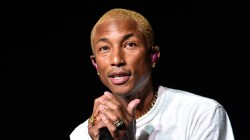Mild-mannered math teacher by day, super intense Eminem analyst by night. Scott Parker might be the last person one would expect to edit and organize an incisive compendium on Eminem’s Raps that’s over 200 pages long, but similarly, Eminem is in some ways the last person one would expect to be the best selling artist of the 21st century. Whether it’s his race, region, or childhood poverty, it’s these very disadvantages–turned–strengths of Eminem that Mr. Parker and his fellow contributors to the new bookEminem and Rap, Poetry, and Race describe and really bring home the importance of to readers.
HipHopDX caught up with Mr. Parker recently to get the inside story on what role Eminem and his people played in the book’s release, a short overview of the book’s material, and how Em’ may have simply run out of things to be provocative about.
DX: Let’s start before this book came out. What was your relationship to Rap generally, and Eminem more specifically, before you even thought up getting this book about Eminem together?
Scott Parker: I’m a fan of Rap. It’s mostly the music I grew up with. Starting from about middle school, that’s what my friends and I would listen to. Tupac was the first person I got really into in high school. After that, it’s the people you would expect. I was into OutKast and Nas. Shit, I don’t know who you would expect, someone else might have a totally different list…They were big for me. When I came across Black Star, that was really big, and then Talib Kweli especially. Getting him to write the foreword was amazing for me. I’ve been a fan of his for so many years and I feel really honored that he was willing to do that for me. Eminem in particular though, let’s see…I didn’t catch on to him right away. It was probably more about the time that the Marshall Mathers LP came out. I listened to that album a lot, and then kind of went back to TheSlim Shady LP.
One of the things I think about in the stuff I’ve written about Eminem is wondering about the role of race. I’m reluctant to just call myself an Eminem fan for a lot of reasons. Well, I should probably get over that. From the time I became a fan of his I wondered about the role of race in that: the first really accepted and successful white Rapper on a national level…I would never have wanted to admit to liking him because we’re both white, but there’s part of me that has to ask myself if that’s possibly part of my interest in him. We have this idea now that because we have a Black president, Black kids are supposed to have more optimism about their possible futures. There’s this idea that, “Oh, that’s the world potentially available to me.” Like Tiger Woods with golf, like it breaks down the barriers. I think there was an aspect of that with Eminem, like, “Oh, wow, this world that’s supposed to be a foreign world…” As I listened to Tupac or whoever to some extent I was a voyeur, and Eminem broke some of that down, like, “Oh, maybe I could be accepted here if I were good at it,” or something like that. I could go on and on with how I’ve changed with respect to Eminem over the years but that’s probably the start of it.

AD LOADING...
DX: You mention a lot of the artists that were very influential for you, like Tupac, Mos Def, Talib Kweli, and others. Why make Eminem the subject of this kind of project and not one of those musicians?
Scott Parker: That’s a great question. I got the idea for this book because I came across Julius Bailey’s book on Jay-Z [Jay-Z: Essays On Hip Hop’s Philosopher King]. I thought, “There should be more like this. This is a cool idea for a book.” I had proposed a similar book about Tupac and for some reason it didn’t really take off, and I’m not sure why. But really, besides Tupac and Eminem — and maybe Kanye — there’s no other Rapper that I feel like I know enough about that I could help out with a book like that, so that’s a big part of it. So the Tupac book didn’t take off, and then I would have gone for a Kanye book too. But Julius Bailey, the same guy who did the Jay-Z book, subsequently had done a similar Kanye book, so those are both out there. I’m probably not the person to do the other books, but I would love it if people would take those up. I think there should be a whole series of these, not to say in any respect that these books are the definitive academic’ takes on these artists. There should probably be books about Eminem saying why my book is terrible, among the other things that there are to say about him. But eventually the reason I did this one, it’s sort of circumstantial, really.
DX: Eminem has always had what might be called a hate–hate relationship with media coverage of him. What kind of part did Eminem or his people play in the process of this book coming together, whether their role was antagonistic or supportive
Scott Parker: That’s good to mention. I got in touch with Eminem’s publicist, Dennis Dennehy, and he was really helpful and supportive of this project. He even gave me a couple pointers on who I could chat with, who I could contact, and who I could reach out to. He’s the only person in the Eminem camp that I had direct contact with. He was a great help, so I really appreciated that. The legal issue with the lyrics was really frustrating. Dennis encouraged me to actually just ignore it, like, “This is not a worry.” All of these lyrics are available online on multiple sites. Anyone who’s interested could find them, and to think that someone would not buy an Eminem record because he could read the quotes from one of the songs in this book is absurd. But McFarland [the publisher of the book] was very sensitive about that, and they were scared to death of being sued by whoever owns the rights to the songs. They didn’t want to compromise on that, and unfortunately that meant we had to lose the one Zadie Smith piece that she did for Vibe on Eminem back in 2001 or 2002. I was talking to her agent or manager about getting that included and they were open to it, but we couldn’t do it because she quotes from “Square Dance” primarily, but other songs as well. That was a major disappointment.
DX: You contributed the first chapter to this book, and then edited the rest of the chapters, which were each written by a different author. What were some of the individual chapters from this book that you found really interesting?

AD LOADING...
Scott Parker: I’ll talk about a couple of them. I think Darin Flynn’s chapter was really interesting. Among other things, he gets into looking at the speech patterns that Eminem uses in his Raps, and what that says about dialects, what that says about regionalism. The way he drops certain letters off of pronunciations: is that a Black English thing? Is that a specifically Upper Midwest Black English? It’s academic-y, but I think it’s super interesting. There’s an appendix to this book by this guy who I know up in Minnesota, a Rapper named Guante, and I think it’s really cool. He writes a dialogue or kind of play that dramatizes what it’s like to have these conversations about Eminem, and how difficult it is to talk about him because of the stuff that comes up about race, primarily. He puts that in the voice of a bunch of different characters. He really performs the whole circus around these conversations with Eminem. Julius Bailey, who I mentioned already, has a chapter with David Leonard. They talk about how as a white artist Eminem is given this opportunity to present his own redemption in a way that is denied to black artists. I think that’s really an important chapter.
DX: What was one really surprising fact that you learned about Eminem as you put this book together?
Scott Parker: The hardest piece for me to edit in this book was Martin Connor’s, and that’s because the music side of this to me is the really hard part to grasp. That’s because I don’t have that much of a background in music. I mean, I have no background in music, none at all. I was invited to quit piano lessons as a kid because no one saw any point in continuing. To edit his chapter, I had to really try to grasp what he was saying, and it was difficult. I can sort of tell already that Eminem is doing complicated stuff musically. But I don’t have the vocabulary to describe what he’s doing, in terms of which quarter-eighth note he’s coming in on, or that sort of stuff, so his chapter was one I learned a lot from.
DX: One of the things that gets focused on a lot in this book is Eminem’s highly developed use of persona. All Rappers to some extent take on a different identity when they Rap, but Eminem stands out because he has so many different “characters,” so to speak. There are at least 3: Slim Shady, Eminem, and Marshall Mathers. Do you see any other Rappers who are similar to Eminem in this way because they also have highly developed personas?

AD LOADING...
Scott Parker: The first people that come to mind would be the Wu-Tang Clan members. The whole idea I’ve heard for the Slim Shady character was Proof’s idea, his idea that all the guys in D12 had to have these alter egos, and all of these guys had at least a couple I think. I don’t know of anyone who’s done it on as big a scale as he has done it.
DX: Eminem’s 3 personas can largely be differentiated from each other by how closely they align with Eminem’s actual biographical details. With all of these competing forces, how do you answer the question that defines Rap for a lot of people: what is “realness”?
Scott Parker: I think the first part of the response is going to be that Rap is a performance. It’s all artifice. You get up there, you spit your Raps, and then primarily the question is: are you good at that? So it’s a matter of the quality of the Raps. The second level is, because Rap is delivered in the first person voice, the question of the artists’ standing there on the stage in front of you comes into play. The Rick Ross example is a good one. I remember during the Jay-Z–Nas feud, there was some kind of line that Jay-Z Raps where he’s like, “You ain’t live it, you witnessed it from your folk’s pad / You scribbled in your notepad, and created your life.” [“Takeover,” Blueprint, Jay-Z, 2001.] The indication there is that Nas isn’t real. Jay-Z is real. To me, it doesn’t matter because Nas is a great poet and a great artist. But that’s always been a part of Hip Hop, I think.
To keep it with Eminem, one of the things that got him a lot of credibility was, “Oh, he came up with this.” And really, at a basic level, he had black friends, and that brought him a lot of credibility. I think that the whole notion of realness in Rap though has shifted a lot, going back to the mid-90s, when keeping it real was the thing that mattered. I think the murders of Tupac and Notorious B.I.G. in a way are responsible for complicating people’s understanding of what realness means. If realness means living up to the character in your real life and that leads to getting killed, maybe the question is, “Is that worth it?” I think there’s a lot more fluidity now. It might just be with the next generation coming along. There’s a lot more fluidity now with what it is okay to be as a rapper.

AD LOADING...
But I think there’s a lot of progress with that and I think it’s because I’ve been around the art form long enough to understand better that it is an art form. Whereas, one of the fears of white America was that N.W.A was really going to come shoot them, right? It was totally ridiculous. It stemmed from this inability to see that art was art. I think the thing with realness in Hip Hop is that the artist has taken advantage of that misconception, and Eminem has done this again and again. Some of my favorite parts of his early stuff are on songs like “Criminal.” The idea that we’re conflating art with real life becomes part of the art, so it’s always sort of spiraling back on itself. You can’t ever get any firm ground to stand on as a listener. Whatever your assumption is, it’s cycled back into the song. Eminem wants to have it both ways, and I think that’s one of his weaknesses. It’s that he wants to be serious sometimes, he wants to reserve that right, but he also wants to reserve the right to decide when those moments are. And then mock you or criticize you, or try to shock you in the other moments. I think as listeners we need to be as sophisticated as we can be, even if our artists — Eminem in particular — don’t live up to that complicated understanding of persona
DX: One of the things that really stands out in your own chapter was the concise description of Eminem’s content arc over his whole career, from beginning to end. Can you speculate at all on what Eminem might do in the future, judging by what you’ve seen in this content arc?
Scott Parker: I can say a lot on this one, and it’s all sort of my hope for what he might do rather than any prediction of what I think he will do. If the last few years have been any indication, I think what he will do is continue to Rap really well and really fast about a lot of stuff that really doesn’t matter. The way the timing with this book worked out is that it was all finished over a year ago, even before Marshall Mathers LP 2 came out, so that album unfortunately isn’t even discussed in here. But if we think about that album, there’s a lot of really good Rapping on there, but there’s not a lot of really good music on there, I don’t think though. I haven’t even heard too much of this newShady XV album, but what I have heard, it seems like more of the same. What I see in him is his refusal to want to…if “grow” is a loaded term, then just to change. I don’t see him really willing to change as an artist. I think Recoveryhinted at that direction. I was really optimistic around the time of Recovery, but since then I see this regression to Slim Shady that’s really, to me, at this point it’s just boring. To be shocking for the sake of being shocking is not shocking it’s just redundant.



